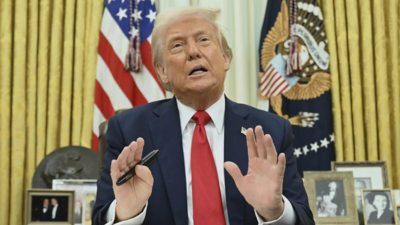TOI Correspondent from Washington: The Trump White House on Monday unloaded on India’s effort to protect its agricultural sector ahead of across-the board-tariff (taxes) on all imports that it plans to announce on April 2, claiming the US is being ripped off by rest of the world.
Flashing graphics showing tariffs imposed by various countries, including India, on US farm products, White House press secretary Karoline Leavitt said it is the time for “reciprocal tariffs” and President Trump would make a “historic change” to the dynamic on Wednesday.
“If you look at the unfair trade practices – we have 50% (tariff) from the European Union on American dairy and a 700% tariff from Japan on American rice. You have a 100% tariff from India on American agricultural products and nearly 300% from Canada on American butter and cheese,” Leavitt said, complaining that this makes it virtually impossible for US products to be exported to these markets and it has put a lot of Americans out of business and out of work over the past several decades.
Trump himself indicated that the tariffs he is going to roll out, ironically in the White House Rose Garden, won’t be prickly or reciprocal, promising to be relatively “very kind.”
“We are going to be very nice by comparison to what they were. The numbers will be lower than what they have been charging us, and in some cases, maybe substantially lower,” Trump told reporters at the Oval Office, amid reports of aides preparing an across-the-board 20 per cent tax on imports.
Trump also said that he had heard that India is going to be dropping its tariffs very substantially. “I said why didn’t somebody do this a long time ago,” he added snippily.
New Delhi is reported to have offered to lower tariffs on select goods, including farm products such as some fruits and nuts, oats and quinoa, while protecting its cereal sector (mainly wheat and rice) that employs a majority of its 46 per cent agricultural work force. India’s taxes on US farm produce is also widely seen as an effort to develop, given its historical experience with famine and shortage, basic food security and not rely on imports — the same arguments US is now making in the pharma sector.
According to experts, White House gaslighting on the issue also glosses over the more than $16 billion in annual subsidies to the US farm sector from the federal government, while discounting historical experiences, economic vulnerabilities, and cultural sensitivities in other countries.
For instance, New Delhi is dead set against US dairy products (milk and cheese) not only to protect its retail dairy sector that employs millions of poor people, but also because of American proclivity to grow its cattle on ruminant feed like bonemeal and bloodmeal. India also has reservations on the quality of industrial grade American chicken — grown in grotesque conditions at corporate broiler farms — but is believed to have reluctantly agreed to make some concessions to allow import of chicken legs despite protests from the poultry sector.
By some accounts, American farmers receive an average of $16 billion annually in direct payments through the farm bill, with total farm support from 2018-2022 reaching a staggering $162.4 billion.
Despite the heavy White House spin that tariffs will turn out well for the US and make it even more prosperous, there is widespread concern across America that taxing imports will result in higher prices and inflation. Some experts have warned of economic havoc, but the White House is besotted with the idea that the taxes will bring in $ 6 trillion in revenue in the long run no matter the pain it will bring in the short-term.


